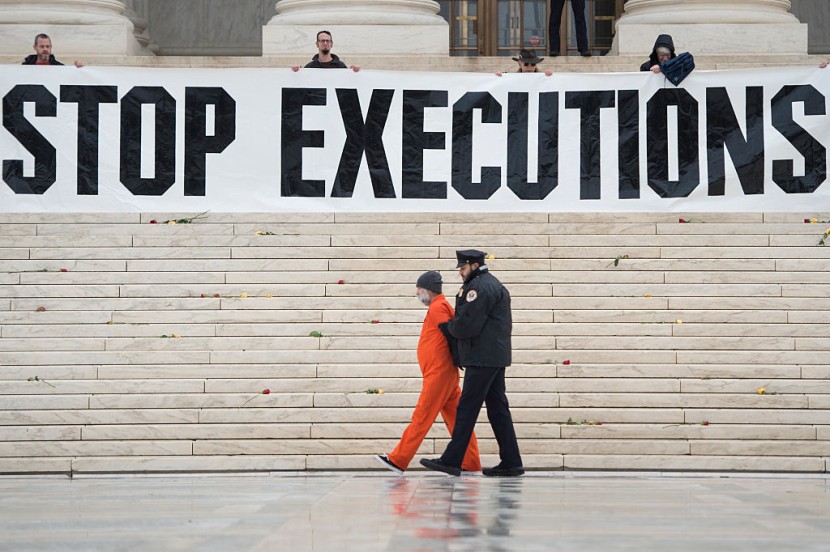On Wednesday, the Supreme Court gave the green light for Alabama officials to proceed with the execution of a death row prisoner using nitrogen gas. This method has faced criticism for being untested and lacking adequate safety protocols.
Kenneth Eugene Smith, who was convicted in a 1988 murder-for-hire scheme, has made a last-minute plea to the high court to intervene just days before his scheduled execution on Thursday evening. The recent legal dispute revolved around the methods used by states that permit capital punishment to carry out executions.

The court's concise order provided no explanation, and there were no recorded disagreements. According to his lawyers, Alabama officials made an unsuccessful attempt to execute Smith in November 2022. They encountered difficulties in finding a vein to administer the lethal injection, resulting in Smith being strapped to a gurney for an extended period of time.
Officials have set a new date and are preparing to use nitrogen hypoxia as the method of execution. This method has not been used in any execution by any state or the federal government before. According to Smith's lawyers, the state's decision to proceed with a second execution is being argued as a violation of the US Constitution, constituting cruel and unusual punishment.
Nitrogen hypoxia is a method of execution that involves the intentional deprivation of oxygen to the inmate, resulting in asphyxiation.The air we breathe is composed of approximately 80% nitrogen, a gas that is colorless and odorless. Nitrogen only becomes lethal once it is deprived of oxygen.
In a recent court filing, Smith's lawyers argued that the upcoming execution presents an extraordinary situation. They highlighted the fact that the state plans to use a previously untested method of execution on their client, after subjecting him to a failed attempt using a different method over a year ago.
While the court's conservative majority is not known for granting execution delays, this case raises unique concerns. Alabama Attorney General Steve Marshall (R) countered these concerns, asserting in a court filing that nitrogen gas is considered to be one of the most humane methods of execution ever developed.
Per USA Today, the state's lawyers argued that the Alabama appeals court made the right decision in dismissing Smith's constitutional claim to halt his execution. They cited a case from the 1940s that involved a botched electrocution. The filing stated that Alabama made an attempt to set up an IV but did not proceed with administering the lethal injection drugs.
Alabama Governor Kay Ivey has decided to halt lethal injections in 2022 for review, following the recent unsuccessful execution attempt of Smith. This marks the second time in three months and the third time in four years that the state has experienced a botched execution.
In 2021, the Biden administration implemented a moratorium on federal executions. However, states have the authority to carry out executions, and the temporary suspension does not prevent federal prosecutors from pursuing capital punishment.
Read Also: Heather Stines Case: Brooklyn Woman Detained After Severed Head, Body Parts Found in Freezer
Kenneth Eugene Smith Case: Man Hired to Kill Woman For Insurance
Smith is currently incarcerated in Alabama for his involvement in the tragic murder of Elizabeth Sennett in March 1988. Sennett was brutally attacked with a fireplace implement in a disturbing incident that was made to appear as a home invasion and burglary at her residence in Colbert County, Alabama, according to court records.
Authorities have concluded that the victim's tragic demise was the result of a sinister scheme orchestrated by her spouse, Charles Sennett, a financially troubled preacher from the Church of Christ. It appears that he conspired to end her life in exchange for a substantial insurance payout. A man was contacted by Charles Sennett, who in turn enlisted two individuals to carry out the murder of Elizabeth Sennett.
One individual involved in the incident, Smith, has adamantly denied any involvement in the stabbing of the woman. Charles Sennett generously compensated the men with $1,000 each, which would be equivalent to approximately $2,600 in today's currency.
According to state officials, Smith opted for nitrogen gas as his preferred method of execution after the state encountered difficulties accessing his veins and had to cancel his scheduled execution in 2022. According to Smith's lawyers, he is not seeking the Supreme Court's judgment on the constitutionality of nitrogen gas usage.
Rather, he is questioning whether the Eighth Amendment forbids a subsequent execution attempt following a failed one. However, Alabama's lawyers strongly emphasized the importance of nitrogen gas in their argument to proceed with the execution.
Capital defense lawyers have raised concerns about the perceived unfairness of the burden faced by death row prisoners when challenging the constitutionality of an execution method. In a 2015 ruling, the US Supreme Court stated that for Oklahoma inmates to challenge a particular method, they must present a viable alternative.
Related Article : United Nations Alarmed Over U.S. First Planned Execution by Nitrogen Gas
© 2025 HNGN, All rights reserved. Do not reproduce without permission.








